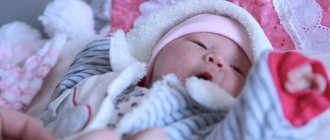Features of the development of the speech apparatus
The child discovers the first possibilities of communication when he learns that crying can help him get food and comfort. Moreover, from the first months, newborns already begin to recognize important sounds around them, for example, their mother’s voice. As children grow older, they begin to understand the speech sounds that make up the words of their language. By six months they can already distinguish all sounds.
Important! As with any aspect of development, each child has a different rhythm when acquiring language. It all depends on the individual development of the baby, on when his brain is biologically prepared to utter his first words.
However, not all children follow a natural progression, or series of stages, to master language skills. Sometimes they are delayed in reaching these stages due to problems with hearing, in other cases - with the organs that make up the speech apparatus (central nervous system, lungs and bronchi, throat and larynx, oral cavity and nose). Also, the development of speech can be influenced by the external conditions in which the child grows up.
Norms of speech development
When does a child start talking?
Speech is the act of speaking, one of the ways of communication. It involves the precise coordination of the muscular actions of the tongue, lips, jaws, and vocal tract to create the recognizable sounds that make up language. In the development of speech and hearing, a child must go through a number of successive stages, at each of which he must show certain achievements.
Newborn up to 3 months:
- reacts to sounds;
- calms down and smiles when spoken to;
Baby smiling at mom
- cries in a special way, depending on what is bothering him;
- begins to moo and make separate sounds.
From 4 to 6 months:
- follows sounds with his eyes, trying to determine their sources;
- reacts to changes in the mother's tone of voice;
- recognizes objects that produce sounds;
- pronounces a number of simple syllables, such as “ma”, “ba”, “pa”;
- able to laugh.
From 7 months to 1 year:
- turns his head and looks where the sounds are coming from;
- listens carefully when adults speak;
- babbles groups of syllables “babababa”, “papapapa”, “mamamama”;
- imitates different speech sounds;
- understands some words and correctly associates them with objects and actions;
- communicates using gestures, such as raising hands;
Baby waving his hand
- can speak a few short words.
From one to two years:
- knows different parts of the body and can point to them when asked;
- fulfills simple requests, such as “Give me the ball”;
- enjoys stories, songs and poems;
- connects words into simple sentences: “Where is dad?”;
- constantly replenishes speech with new words;
- pronounces more and more consonant sounds.
When they say that a child speaks at one year, this means that he pronounces a few simple words and understands speech addressed to him.
Basic skills of children per year
Before assessing various indicators of a child, you need to remember the rule: all children develop individually. Their height and weight are often related not only to lifestyle and amount of food, but also to nationality and genetic inheritance. As Dr. Komarovsky says, it never hurts to take a look at yourself and your spouse before weighing and measuring your baby’s height.
Physical development
What should a 6 month old baby be able to do?
Average weight and height for boys and girls by 12 months
| Gender of the child | Weight, kg | Height, cm | ||
| Average | Normal range | Average | Normal range | |
| Boys | 10,8 | 9,4-11,9 | 75,7 | 73-79 |
| Girls | 10,1 | 9,0-11,3 | 74,8 | 72-77 |
The weight of the child from the moment of birth increases by 3-3.5 times. Monthly weight gain decreases to 300-350 g. Monthly height gain also decreases; by the age of one year it is already 1.5 cm. A one-year-old baby has acquired 4-8 milk teeth, which he successfully brushes with his own toothbrush with a drop of toothpaste.
The period of active crawling gradually gives way to bold attempts to learn to stand independently without support and take the first steps. In this matter, all kids behave differently. Some people not only walk, but run quite successfully at the age of one year, while others do not let go of their mother’s hand and are afraid to take a step away from it. Holding your hand, the child tries to go up and down the steps. Children climb on and off the sofa on their own.
Important information! At this age, it is especially important to ensure the child’s safe movement in space: do not leave him alone in a room with open windows, secure cabinets and shelves so that they do not tip over, remove wires and secure sockets.
Physical development
Household skills
The child shows independence: picks up a spoon and a sippy cup, tries to eat and drink. He takes off and puts on clothes that suit him: a hat, slippers, socks. The baby independently holds and bites off pieces of bread, banana, and apple. He learns to observe the rules of hygiene: he washes himself and wipes himself with a towel, takes a toothbrush in his hand, and tries to get acquainted with the potty.
Holds a spoon independently
Psychomotor development
At 1 year old, children learn about the world through tactile sensations, and also, when tasting objects, they still put everything in their mouth. Movements become meaningful; at the request of an adult, the child raises and lowers his arms and legs when he is dressed, picks up a comb and combs his hair, like mom or dad. At one year old, children can perform the following actions:
- open and close cabinets and doors, lift lids and open boxes;
- pull out drawers;
- pour and scoop water;
- throw a ball, kick it;
- pull toys by the string, turn them over;
- play in the sandbox - pour sand into a bucket with a spatula, pour it back in an attempt to make a Easter cake.
Ball game
Social behavior
The age when a child turns 1 year old is the time of active manifestation of meaningful emotions. The child learns to express his feelings and talk about his needs by crying or laughing. Previously, all issues were resolved by shouting. In addition, the following skills have been developed:
- reacts with interest to new objects and faces in the environment;
- recognizes his loved ones from a distance;
- looks at photographs, finds familiar faces, points;
- grimaces, makes faces, sticks out tongue;
- able to repeat sneezing and coughing after an adult;
- understands the prohibition addressed to him, knows the meaning of the word “impossible”;
- in books shows familiar animals (dog, cat) or objects;
- listens and moves to rhythmic music, tries to “dance”;
- knows what the TV remote control and telephone are for, makes bold attempts to grab and use them;
- refuses to eat if he is not in the mood or does not like the dish;
- meets mom or dad on the threshold of the house, waits for them at the door.
Playing with the phone
Motor skills
Enough attention must be paid to the development of motor skills in order to develop speech abilities. One part of the brain is responsible for these two skills. Therefore, at this age, the baby must confidently and firmly hold objects in his hands and transfer them from one hand to another. The following games develop this skill well :
- building a tower from cubes;
- assembling simple pyramids and playing sorters;
- selection of insert figures for the desired shape;
- games with ball and regular plasticine, modeling dough;
- after the game, put the toys away in a box or container.
For kids, it’s good to purchase or print simple coloring books with large details and give them soft pencils or wax crayons. This is how large and fine motor skills of the fingers are trained.
Pyramid assembly
Alarming symptoms
We can talk about a simple speech delay when, relative to the child’s chronological age, he masters certain stages in speech development later. If a child does not yet say “mama” at one year of age, this does not necessarily indicate a speech disorder, especially when he pronounces other sounds.
Why does a baby cry when he wakes up?
However, it is not always easy for parents to find out how much time their baby needs to master the next stage of speech development. They worry, assuming there are problems that require medical help.
Important! A child who does not respond to any sounds and does not make them himself must be shown to a specialist.
Which sign may indicate problems with the speech apparatus is determined depending on age:
- One year old: does not use gestures to communicate (does not point, does not wave goodbye, etc.);
- 1.5 years: communicates only with gestures, without trying to reproduce syllables, cannot imitate sounds, poorly understands or does not understand requests addressed to him at all;
- 2 years: able only to repeat the words and actions of adults, but does not show the initiative to communicate, has a strange tone of voice (for example, wheezing).
Important! If the baby does not pronounce words properly, so that even the mother does not understand him (in a two-year-old child she should understand about half of the words, in a three-year-old - 75%), this is also a reason to contact a specialist.
Standards for what a 1 year old child should be able to do
A one-year-old child of responsible parents should definitely come to many specialists for examination. A pediatrician, neurologist, ophthalmologist, surgeon and others carefully examine the baby, weigh, measure him and ask mom or dad many questions. They ask what the child does per year, how he sleeps and walks, how many words he already speaks. These questions are not idle; experts use them to determine the level of mental and physical development of the baby.
Based on what a child can do at this age, they judge whether he has serious developmental disabilities or conclude that all indicators are within normal limits and there are no deviations. There are special tables with indicators of standard height and weight, head and chest circumference. These tables are used to evaluate the child's physical condition. Doctors evaluate psychomotor, social and everyday skills using a development calendar - a special list in which all skills are deciphered in detail. The baby should master them by his first birthday.
There are differences in physical standards for boys and girls. This is due to the fact that, according to statistics, boys are usually born larger than girls. Therefore, their height and weight indicators are slightly higher. But girls develop faster emotionally and psychologically, and quickly gain their vocabulary. For the harmonious development of children, it is necessary to show care and trust to children of any gender. For a girl, special attention should be paid to care, a boy should be given more trust, and given space for independent choice.
Boys and girls have different care needs
Causes of delayed speech development
When a child says "mama"
Why a one-year-old baby does not pronounce syllables and does not show interest in communication is determined by various factors:
- Anatomical disorders in the development of the tongue and palate. For example, a short frenulum, or fold under the tongue, limits the movement of the tongue when pronouncing sounds;
Short frenulum in a child
- Hearing problems. They may occur due to defects in fetal development during the mother's pregnancy, hereditary diseases, complications after ear infections.
Important! If a baby has hearing problems, he also cannot imitate sounds and understand words spoken to him.
- Genetic factor. When a child has relatives who started speaking late, it is possible that he will not speak early;
- Disorder of oral-motor functions. They occur when areas of the brain involved in speech production have problems that make it difficult for a child to coordinate the tongue, jaw, and lips;
- Autism. Children suffering from autistic disorders begin to speak much later due to self-absorption and withdrawal from the world around them;
Autistic child
- Delayed mental development;
- Sexual characteristic. It has been observed that boys begin to talk later than girls. This is true for most male babies, but not all. Interestingly, boys begin to form words into sentences faster;
- Simultaneous learning of several languages. If the family speaks different languages to the baby, then it takes him more time to recognize sounds and understand the meaning of words.
Important! To successfully master several languages at the same time, it is necessary that each adult speaks only one of them to the child. Then it is easier for the baby to associate a certain person with characteristic speech sounds, and language acquisition proceeds faster.
- Presence of systemic diseases. If a child suffers from serious illnesses since childhood, he may experience a decrease in general interest in cognitive activity;
- Nervous stress. If the baby has suffered a strong emotional experience, which may be associated with an unfavorable atmosphere in the family, separation from the mother, etc., the development of his speech may slow down;
- Lack of communication. In families where they pay little attention to the baby and do not try to interact with him through gestural communication or conversations, his speech skills are formed with a delay;
- Overprotectiveness. When the baby is not encouraged to express his desires, but tries to prevent them, the motivation to pronounce words decreases.
Appearance and characteristics of a child from one to two years old
The child looks disproportionate in relation to the adult: he has a large head and short limbs. Bones, ligaments and muscles grow and develop rapidly, so excessive stress is not needed. Mothers do the right thing when they take strollers or other devices for transporting children on long walks - this way the kids can rest during transitions and not experience musculoskeletal stress.
Most children walk awkwardly. The fact is that the center of gravity is located higher and it is difficult to maintain balance.
The tumbler easily restores its position, since its center of gravity is at the bottom. But try to give balance to an ordinary plastic doll - this is much more difficult to do.
Ways to accelerate speech development
If the baby does not have any problems with speech development that require the intervention of specialists, parents can talk to him, paying attention to the baby throughout the day:
- You need to constantly talk to your baby from birth. In addition to the fact that the voice of dad or mom calms him down, the child gradually begins to understand that language is necessary for communication;
Mom talking to baby
- If the baby is still small, five months or less, then sometimes, when talking to him, you can imitate children’s speech or the voices of cartoon characters, but when addressing children older than six months, you need to pronounce words in a normal tone, without shouting or babying. The baby will imitate exactly the type of sounds that the parents make;
- It is better to use short one-syllable or two-syllable words when asking your baby to do something, for example, “give”, “stop”, “bye”. When imitating longer words, the infant usually pronounces only the last syllable, which is difficult to understand;
- Although a one-year-old baby cannot speak, he absorbs everything that happens around him. While walking, you need to tell us what color the car is, where we are going, etc.;
- Picture books provide good assistance in developing speech skills. You can show your baby different animals and then ask him to recognize them. Soon he will begin to name his favorite characters;
Baby looking at pictures
- Games also stimulate speech activity. Having chosen your baby’s favorite toy, you can show it and then put it somewhere, for example, hide it under other toys. Then encourage the child to look for it, sorting through objects and asking about each one;
- Children love music, songs, and rhymes and try to repeat them after their mother. They immediately recognize their favorite melodies and are happy when they hear familiar sounds.
Don't worry if your baby doesn't say many words a year or only produces syllables. With patient and calm activities with the baby and sufficient attention, he will soon begin to surprise his parents with his achievements every day.









